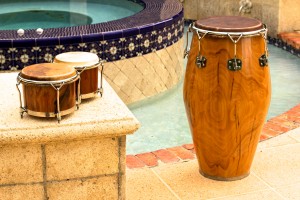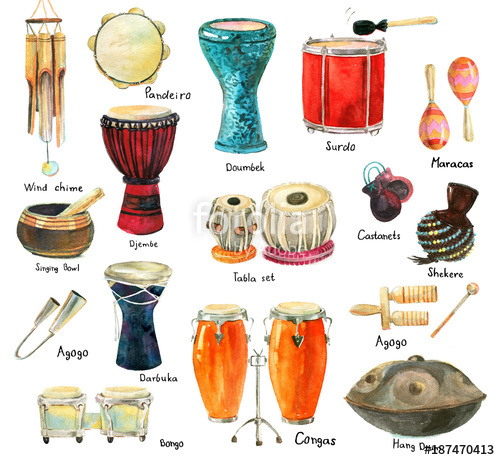I am curious why a finely made hand crafted musical instrument like a hand carved djembe drum or artisan made conga drum or bongo should be looked at any differently then a Martin guitar in terms of value or price? I understand anything sold is market driven but I do believe it goes beyond this.
No one thinks twice or questions the price of a top of the line guitar. When I see these guitars for sale I never see any feedback that say’s, “that’s too much” or “it’s too expensive”. People accept it as a finely made instrument made by master craftsmen. Of course there has been years of advertising and marketing.

People know what it is, they educate themselves about the instruments and if they don’t want to spend that kind of cash then they buy a cheaper model. For example, a Martin SSD3513 Acoustic Guitar Natural with Case is $8000.
Or perhaps a $32,000-$250,000 piano? How do so many people afford these? People invest and they also invest in lessons on how to play the instrument as well. There is an acceptance.
It’s time for us all to recognize and accept that professional level congas, djembes and bongos are indeed musical instruments and not toys. Top of the line hand built djembes, congas and bongos are just as valuable, are made just as well as any other musical instrument. There is an amazing amount of time, work and skill involved. A djembe, conga drum or bongo is not a toy for a play shop.
I am not suggesting we raise prices of hand percussion, nor do I want to pay more. What I am questioning is why we do not look at percussion instruments made by amazingly skilled master drum makers the same way we look at other musical instruments? Their craft is just as much work and skill if not more then many other musical instruments.

Why do some people think that the drum is not an instrument but a toy? Should something because it is from or originating in West Africa or Cuba be deemed as “cheaper” and if so, why?
Its time we all realize this fact. We need to change our thinking about this. It’s time to end the cultural bias! Because this is a big part of what it is.
Much training and many, many hours go into the making of your drum. There is much innovation each drum creator invokes. There are countless hours put into the whole process of your drum.
Conga drums are made from slats cut from wood, steam bent slats (staves) or solid shell logs that have to be hollowed out. Some of the wood has to be aged over time in a controlled environment. All the metal hardware is painstakingly hand made, hammered or machine bent out.
No matter how it is made, it takes precious time skill and precision to get it right. No two hand made drums are ever the same and even if they look the same and the wood is from the same tree the skin is always going to make it sound and play differently as well.
Congas are put on a lathe where they are turned and shaped. This is a skill and a craft. Gluing them together, finishing them, putting skins on is all an art. Even processing the skin be it conga or shaving of the goatskin for djembe is a skill set.

If a skin on a djembe does not work out, (perhaps it pops) the maker has to put another one on at his own cost. He can not contact the buyer and say, “you have to pay more because this is going to take me another whole day”.
If you worked out a per hour price you would find that it is pennies per hour. No one is getting rich off of high end percussion instruments. I am not talking about cheap factory made drums of course. It’s a labor of love.
Check out the masterful carvings on a Wula Drum djembe. The skill needed is off the chart. Look at a Drumskull Drums djembe. Each drum is a masterpiece! The same holds true for Wassoulou Percussion by Michael Tivier who lives and oversee’s all aspects of his company in Mali.
Great care is taken in the preparation of the djembe drum not only in West Africa but often in the USA or other country the drum arrives in. There can be additional finish work, bearing edge honing, rubber bottoms being glued on. Everything is a process and everything takes time. Nothing is quick on a drum build when you get into the high level drums.

If you educate yourself and learn what goes into the making of your instrument you will find that it is indeed worth every penny and you would not question the price.
The price of a high end instrument is not an arbitrary price. It is based on many factors.
So before commenting to a drum builder or seller, asking for a discount or saying, “that’s too much”, educate yourself what goes into the building of a drum.
If you want a top of the line drum then be prepared to pay for it. If you don’t want to pay then save or buy a cheaper mass produced drum. And that is a fine thing to do. You don’t need a boutique, artisan or vintage drum to sound good.
A great skin and the proper skin choice on most shells along with your well practiced skills will make

most drums sound great! My points here are about education and knowing the difference. It is also about respect of the craft, respect for African and afro cuban, Haitian, Brazilian and other hand drumming, and getting the masses to understand what we do as percussion be it making or playing drums is a valid musical expression and enterprise.
If you want an artisan conga drum you do have to wait. Often the companies such as Manito, PM Percussion, Vega (VGA) and others are one or two man operations. When you order a custom made conga drum, you get to be part of the process as well which is something you do not get to be when you order a drum made in Thailand.

So, please do not complain to these people that are putting their heart and souls into their work. They deserve every penny. I am not advocating a price hike I am asking us all to rethink how we look at hand percussion. The hand drum be it a finely crafted conga drum, bongo or djembe is a musical instrument that has had love, sweat and tears put into it!
The same holds true if someone is going to fix your broken drum for you. There is intense physical labor involved and it takes many hours of hard labour. Please do not try to bargain someone down on their costs. You would not do it with a plumber, electrician or your car mechanic so don’t do it with your local drum repair person or builder.

